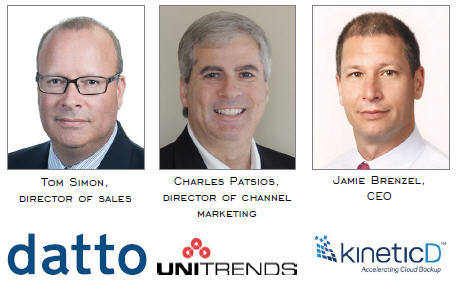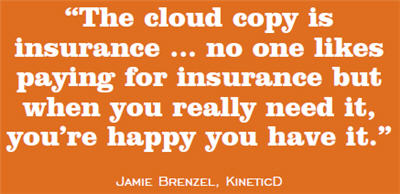Why Selling Hybrid Storage Is The Better Decision
By The Business Solutions Network
By making a few subtle changes to your sales approach, you can start selling hybrid backup solutions that are better for you and your customers.

For nearly all VARs and MSPs selling networking infrastructure solutions, data-backup solutions are a core part of their overall offering. The vast majority of solutions providers sell on-premise backup solutions, which often entails replacing traditional tape libraries with disk-based backup solutions. A small percentage of solutions providers forgo the on-site backup altogether and are moving their customers’ businesses, including data backups, to the cloud. While on-premise backups and cloud-based backups are superior to having no backup, they each have weaknesses that leave your customers vulnerable. The better option you should consider is a hybrid backup solution, which includes both on-site and off-site data backups.
Making The Case For Hybrid Backup
I spoke with three industry data backup experts from Datto, KineticD, and Unitrends to get their take on hybrid data backups, including their advice on how to sell it, objections you should anticipate, and how you can overcome those objections. The first thing that’s important is that you understand why hybrid is a better option for your customer. Here are two things to consider:
- True disaster recovery. If your client suffers a worst-case scenario, such as a fire, flood, tornado, or earthquake, its local backups will most likely be destroyed along with the rest of the office. This is where the cloud backup becomes so important, because the data is automatically copied to a secure, off-site data center that’s far enough away from the client’s facility that it wouldn’t be impacted by the same natural disaster. Government organizations like FEMA track businesses impacted by disasters like hurricane Katrina, the Joplin, MO, tornadoes, and hurricane Sandy. More than half of the businesses impacted by such disasters are never able to recover. Data lost during these disasters and the time and effort to recover the data — combined with the task of getting back to work — are too heavy of a burden for businesses to shoulder.
- Faster data recovery. For those opting for the cloud-only backup, it’s important to look at two facts: 1. on-premise server failures are much more likely to occur than natural disasters and 2. the speed that data can be restored over customers’ local area network is far faster than they can restore data over the Internet. “There’s just no comparison between the recovery speed of a local area network and Internet bandwidth performance,” says Tom Simon, director of sales at Datto. “That’s why a hybrid solution is the better option because it allows VARs and MSPs to provide the strengths of both kinds of backup and to maintain their reputation as trusted advisers for their clients’ IT infrastructures.”
What You Need To Know To Sell Hybrid Backup Solutions
Convincing yourself that hybrid backup solutions are the right option for your customer is only half the battle. The next thing you need to consider is how you’re going to convince your customers. Since most VARs and MSPs will have customers who already have on-premise backup systems in place, here are some ways to engage those customers about upgrading to hybrid backups. “The VAR/MSP needs to understand the customer’s data size, makeup, and change rate as well as the customer’s overall sensitivity to downtime and cost before discussing the specifics of a hybrid solution,” says Charles Patsios, director of channel marketing at Unitrends. “The maximum amount of downtime must be taken into consideration when understanding how much data should be left on-site and how much can be retained in the cloud.”

One thing you can’t underestimate before selling hybrid backup solutions is the importance of your salespeople. “An educated salesperson is always a better salesperson,” says Jamie Brenzel, CEO of KineticD. “Talk to hybrid backup vendors for assistance before you go out to sell the product.” Hybrid storage vendor partners have a vested interest in helping you get up to speed with this technology and your sales approach.
The consultation process is an important step that you can’t overlook with selling this kind of solution. And you should never make assumptions about customers’ recovery time objective (RTO) based on their annual revenues or number of employees. “A small business’ lack of operating capital can require just as short of RTO as a larger customer that’s governed by industry regulations like HIPAA or Sarbanes-Oxley,” says Simon.
Anticipating, Overcoming Common Hybrid Backup Objections
While each customer is unique in some aspects, you’ll quickly find that the objections to selling hybrid backup solutions are not. In fact, just about every objection you’ll run into will focus on security to some extent. Customers want to know who has access to their data besides them. They may want to know what kind of encryption and other security measures are used by the cloud provider. Customers governed by strict industry guidelines may also worry that moving their data to the cloud could leave them open to fines. The following are a couple of suggestions for anticipating and overcoming these objections.
- Do your homework on your cloud services provider up front. Before you can confidently offer a hybrid backup solution, you need to ensure you’ve done your due diligence on your provider as there are some key differences between the type of cloud backup geared toward consumers and what your business clients require. “Consumer grade offerings provide limited amount of protection as well as resources to meet the need for a growing business,” says Patsios. “For starters, you should ensure your cloud provider can provide an SLA [service level agreement] that guarantees uptime and protection of your customers’ data.” In addition to reviewing the cloud provider’s documentation, KineticD’s Brenzel recommends asking the provider specific questions to fully understand how it’s protecting customers’ data. “Some providers keep only one copy of a customer’s data, which they protect with RAID 6 drive arrays,” he says. “We feel that providers need to keep two separate copies of customers’ data in addition to protecting that data with RAID 6 arrays.”
- Encrypt data for further security. Even though your cloud provider should already have access control processes in place to protect your customers’ data, encrypting that data is another practical way to give your customers another layer of protection. “We recommend that VARs/MSPs encrypt data on-site, prior to backing up the data to the cloud,” says Simon. Brenzel agrees with this advice and adds, “Look for solutions that support 448-bit Blowfish encryption for local and cloud backups. To our knowledge there has never been a case where someone has cracked that level of encryption.”
Most customers understand how valuable their data is to their organizations, but many take for granted that it will always be there. Getting those same customers to spend a little more for a hybrid backup solution is a similar process to selling insurance. “The cloud copy is insurance, and like most people, no one likes paying for insurance, but when you really need it, you’re happy you have it,” says Brenzel.
